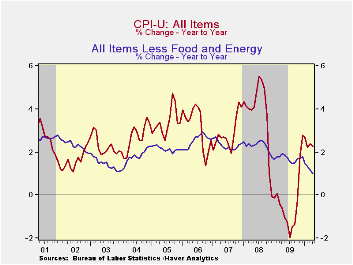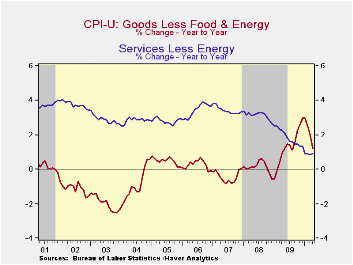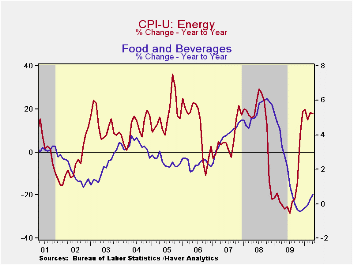 Global| May 19 2010
Global| May 19 2010U.S. CPI: Broad-Based Weakness Is Behind Slight M/M Decline
by:Tom Moeller
|in:Economy in Brief
Summary
Moderate economic improvement since the middle of last year has done nothing to improve retail pricing power. The Consumer Price Index for April fell 0.1% (+2.2% y/y) and reversed a modest 0.1% uptick in March. The latest figure fell [...]

Moderate economic improvement since the middle of last year has done nothing to improve retail pricing power. The Consumer Price Index for April fell 0.1% (+2.2% y/y) and reversed a modest 0.1% uptick in March. The latest figure fell short of Consensus expectations for a 0.1% gain. Moreover, continuing weak was the 0.5% (AR) CPI increase so far this year.
A 1.4% drop in energy prices was behind much of last month's total decline, the third consecutive monthly slip. A 4.4% drop (-2.9% y/y) in natural gas prices led the decline followed by a 2.4% drop in gasoline prices (+38.3% y/y). Higher fuel oil prices (28.0% y/y) offset much of these declines along with an uptick in electricity costs (0.6% y/y).
Core consumer prices also were weak. They were unchanged for the second consecutive month. A 0.1% increase had been expected and prices have gained just 0.1% since October. Core goods prices led the weakness with a 0.3% decline, the third consecutive monthly shortfall. Lower apparel prices fell by a sharp 0.7% (-0.9% y/y) while prices of home furnishings & operation declined by 0.5% (-2.8% y/y). New & used motor vehicles prices rounded off the weakness and slipped 0.2% (+4.9% y/y). Tobacco prices nudged up 0.1% (6.1% y/y).
Core services prices strengthened marginally and rose 0.2% (0.9% y/y). That improvement was led by a quickened 1.7% increase (8.4% y/y) in the cost of public transportation. The 0.3% increase in recreation prices also was a bit improved (-0.4% y/y). Elsewhere, weakness in the housing market left shelter prices unchanged and down 0.6% y/y. Owners equivalent rent of primary residences, a measure not equivalent to other house price measures, slipped again m/m (-0.2% y/y). The slight y/y decline in this measure was the weakest reading since the series' start in 1983. Elsewhere in services, education costs rose 0.5% (5.0% y/y) and medical care services prices again rose 0.3% (3.7% y/y).
Food & beverage prices again firmed a bit by 0.2% and the y/y gain of 0.5% was improved from late-last year's low of -0.5%. Dairy prices firmed by 0.1% y/y versus the 10.4% decline last summer. Also showing less deflation were prices for meats, poultry, fish & eggs (-0.2% y/y) but cereal & bakery product prices continued weak (-0.9% y/y). Fruit & vegetable prices slipped m/m but the 1.8% y/y increase is improved from a 6.5% decline as of last summer. Finally, the cost of eating out rose just 1.1% y/y, a record low increase, while alcoholic beverage prices also rose just 1.2% y/y, the least since 1995.
The chained CPI, which adjusts for shifts in consumption patterns, eased last month and rose 2.3% year-to-year. Chained prices less food & energy gained just 0.6% y/y.
The consumer price data is available in Haver's USECON database while detailed figures can be found in the CPIDATA database.


| Consumer Price Index (%) | April | March | February | April y/y | 2009 | 2008 | 2007 |
|---|---|---|---|---|---|---|---|
| Total | -0.1 | 0.1 | 0.0 | 2.2 | -0.3 | 3.8 | 2.9 |
| Total less Food & Energy | 0.0 | 0.0 | 0.1 | 1.0 | 1.7 | 2.3 | 2.3 |
| Goods less Food & Energy | -0.3 | -0.1 | -0.1 | 1.2 | 1.3 | 0.1 | -0.4 |
| Services less Energy | 0.2 | 0.1 | 0.1 | 0.9 | 1.9 | 3.1 | 3.4 |
| Energy | -1.4 | -0.0 | -0.5 | 18.0 | -18.1 | 13.7 | 5.6 |
| Food & Beverages | 0.2 | 0.2 | 0.0 | 0.5 | 1.9 | 5.4 | 3.9 |
| Chained CPI: Total (NSA) | 0.2 | 0.4 | -0.0 | 2.3 | -0.1 | 3.7 | 2.5 |
| Total less Food & Energy | 0.0 | 0.2 | 0.2 | 0.6 | 1.5 | 2.0 | 1.9 |
Tom Moeller
AuthorMore in Author Profile »Prior to joining Haver Analytics in 2000, Mr. Moeller worked as the Economist at Chancellor Capital Management from 1985 to 1999. There, he developed comprehensive economic forecasts and interpreted economic data for equity and fixed income portfolio managers. Also at Chancellor, Mr. Moeller worked as an equity analyst and was responsible for researching and rating companies in the economically sensitive automobile and housing industries for investment in Chancellor’s equity portfolio. Prior to joining Chancellor, Mr. Moeller was an Economist at Citibank from 1979 to 1984. He also analyzed pricing behavior in the metals industry for the Council on Wage and Price Stability in Washington, D.C. In 1999, Mr. Moeller received the award for most accurate forecast from the Forecasters' Club of New York. From 1990 to 1992 he was President of the New York Association for Business Economists. Mr. Moeller earned an M.B.A. in Finance from Fordham University, where he graduated in 1987. He holds a Bachelor of Arts in Economics from George Washington University.






